“Granary” with guests in Kyiv – what is the play about
[ad_1]
The play “Granary” was written Natalka Vorozbyt back in 2009. First performed abroad, on the stage of the Royal Shakespeare Company, it could appear as a production in Ukraine sooner, in 2010. However, the situation changed: even after the presidential elections, the Kolomyia Theater decided not to “tarnish its reputation” with a play about hunger 1932-1933.
Maxim Golenko began work on the production at the Rivne Regional Academic Music and Drama Theater in the uncertain spring of 2022. The premiere took place in September, and already in 2023 it won in 4 nominations of the All-Ukrainian theater festival-award “GRA”. In March 2024, the play toured Ukraine: in Lviv, Kyiv and Zhytomyr. You can see it in the repertoire of the Rivne theater.
“Granary” is a story about the great transformation of the people
Rivne Academic Music and Drama Theater
Show of the play in Kyiv March 27 was sold out – many theatergoers decided to celebrate International Theater Day by viewing “The Granary”. It seems that it was not in vain – the performance was met with a standing ovation.
The play “Granary” tells about the life of a small village in the Poltava region during the great transformations: the Soviet regime, taking off yet another mask, begins forced collectivization. The life of the community, plowed over by wars, after a relative lull changes beyond recognition: the authorities divide people into their own and those of others, cold-bloodedly ravaging unhealed wounds.
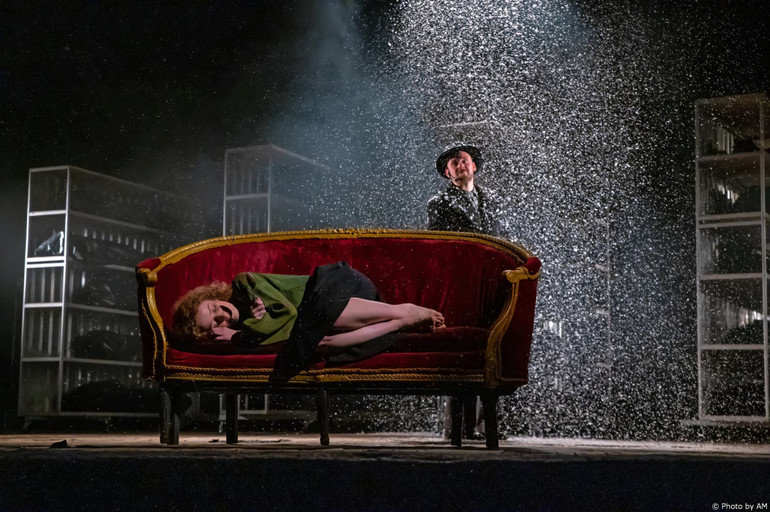
The village community is faced with irresistible changes
Rivne Academic Music and Drama Theater
Maksym Golenko, on the other hand, in his “exhibition of science to a deceived population”, based on the events of the Holodomor, expands the historical horizon: his reading is about Ukraine’s “long” 20th century: from Sovietization, through the tragedies of the Second World War, Chernobyl, the 90s and to the new war .
Non-stop shaking, changing only forms and performers, almost like a rave-style party, continues even now: until final exhaustion. In his characteristic, somewhat burlesque manner, the director is unapologetic – the modern barbarism of Russia has deep and extensive roots, which are firmly rooted in grunt of our fear and total oblivion.
The director begins the performance with a prayer-cry: for the living, the dead, and the unborn. Musical solution of the band “Veremiya” and Stanislav Lozovsky makes a particularly powerful impression right at the beginning – after almost mourning, the hall is ready for the climax in the first minutes of the performance.
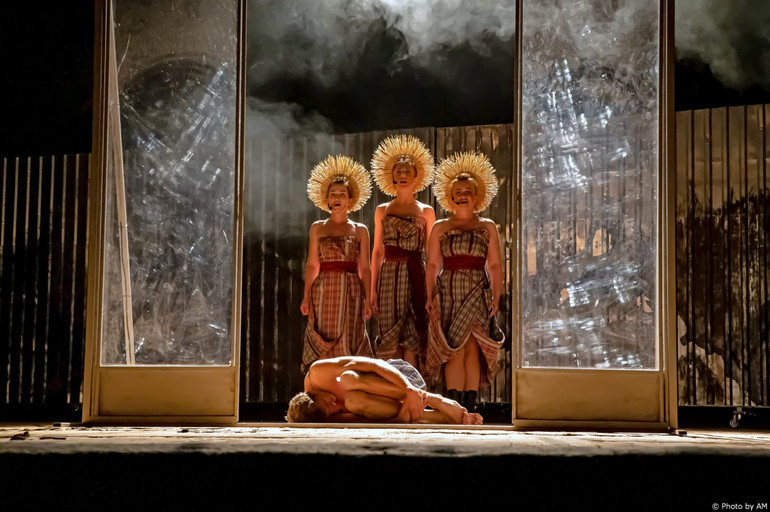
The musical accompaniment makes you feel the tension of the performance
Rivne Academic Music and Drama Theater
However, instead, the audience gets into the anthill of the village, which is on the threshold of great transformations: on the square, lined with rows of household goods, peasants are constantly swarming, mixed with the agitator brigade, activists – the news about collectivization is perceived with caution, but they do not believe it. However, this time the authorities of the councils plan to bring the case to the end – Bookkeeper Mortko will come to the village (Mark Drobot), which, apparently, is not the first time to defund. Zeleny Kut falls into the grindstone of collectivization.
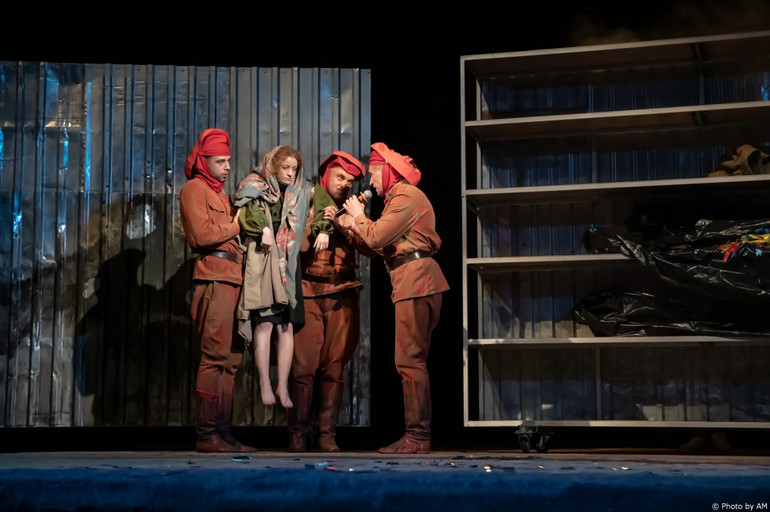
The authorities divide people into their own and those of others, looking for the “culprits”
Rivne Academic Music and Drama Theater
Changes in the life of the community are visualized by constant transformations of space (the artist of the performance, Julia Zaulichna, uses racks for this): the fair rows are empty, people do not walk on the square, but drooping people hang around, the church is turned into a granary. Although the entire performance takes place around the granary church, they are quite conventional.
The scene is constantly transformed: from fair rows to shop windows, from a church to a granary, from a collective farm to the bunks of barracks on which half-dead peasants lie. These racks are like markers of terrible changes: until recently filled with bread, they are more suitable for a morgue.
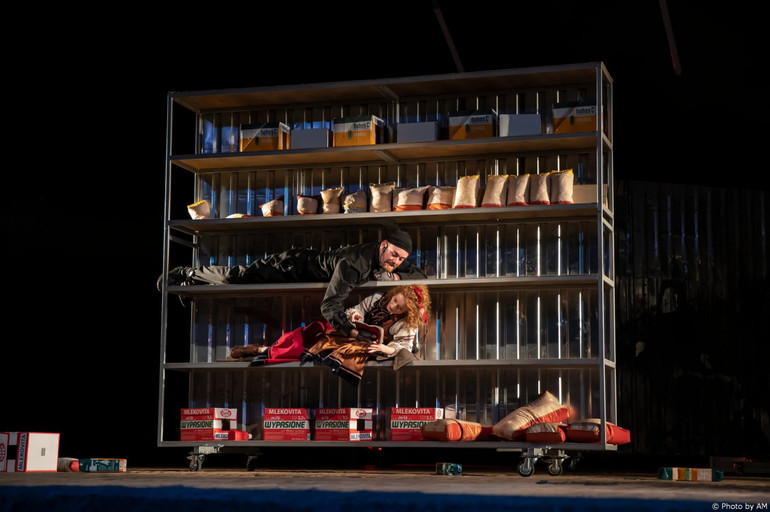
The heroes are forced to squeeze into the shelves of the granary due to the disappearance of supplies
Rivne Academic Music and Drama Theater
Zaida Mortko quickly finds an accomplice among the locals, Arsey Pechoryts, (Dmytro Pshechuk): once a pauper, Arceus is now at the forefront of the new power. It was Arsei and Mortko, each in his own way, who understood the great deception in which they found themselves. Despite the horrors of hunger unfolding as if in the background, the drama of those who understood the abyss over which they stand seems almost more tragic.
Probably, this is why the peasants who die or die, are driven to a collective farm (and almost the entire troupe of the theater is involved in the performance), without having understood the traps, appear rather as an impersonal group, without memory and speechless, which, however, is capable of desperate riot (they kill Mortko).
It is Mortka in a brilliant performance Mark Drobot manages to convey the desperation of the deceived: he, a local werewolf, marginalized because of his origin, never manages to become his own for the new government. He invests his own indifference in the cruelty against the peasants, but later realizes that he remains only a tool in the hands of the Soviets, who sooner or later will destroy him as well.
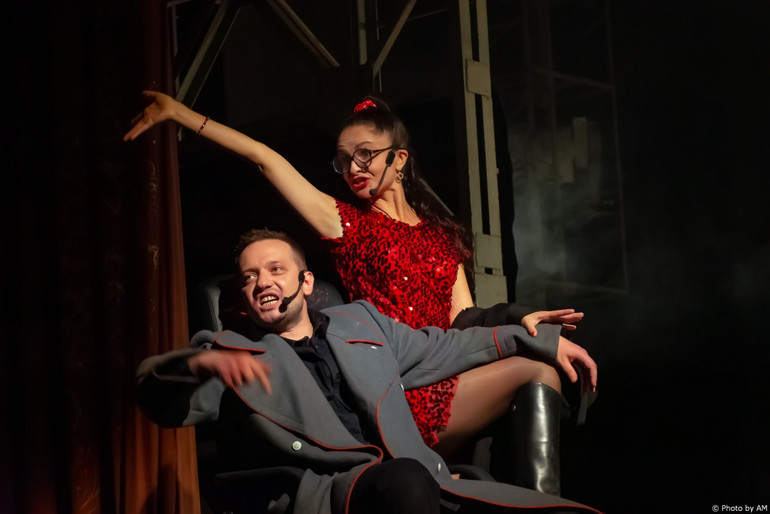
The defunct Mortko the bookworm performed by Mark Drobot
Rivne Academic Music and Drama Theater
However, Maksym Golenko’s performance interprets the Holodomor as only one form of destruction. Physical destruction is preceded by a cultural one: Communism and collectivization take the place of an ideological wasteland: when people have been methodically explained (or have they allowed themselves to be deceived?) that their beliefs, faith and traditions are worthless.
Timidly watching how the bell is lowered from the church, the community seems to condemn itself to a long silence, which will timidly break through the truth only in prayers, even decades later. Hunger creates fear, which turns on the instinct of self-preservation – forgetting.
It is not known whether there are those left in the village who remember that the granary was once a church. However, it seems that in the interpretation of Maksym Golenko, this is not too important – the main thing is to preserve his memory as a repository of lost souls who could not resist the temptation of delusion. After viewing, one does not leave the impression that the performance is a prayer for these souls. And sometimes it seems that it is a prayer for those who, despite the past, are still in the darkness of deception, and will be deceived more than once.
[ad_2]
Original Source Link











